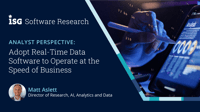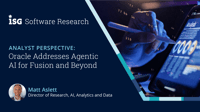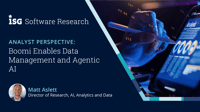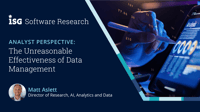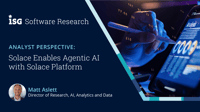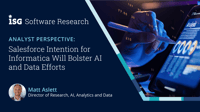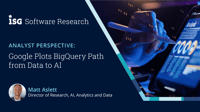ISG Software Research recently published the 2025 Buyers Guide for Real-Time Data, providing an assessment of 43 software providers offering products used by analytics and data professionals to facilitate the use of real-time data. The Real-Time Data Buyers Guide research includes five reports which are focused on overall Real-Time Data, Application Integration, Messaging and Event Processing, Streaming Data and Streaming Analytics. Below I provide an overview of each of the five reports, as...
Read More
Topics:
AI,
AI & Technologies,
AI and Machine Learning,
Streaming & Events
ISG Software Research’s expertise examines the software provider landscape through two lenses: business applications (including office of finance, human capital management (HCM) and customer experience) and IT and technology (including digital business, digital technology, artificial intelligence (AI) and analytics and data). Most software providers fall into one of these two high-level expertise areas. One of the reasons that agentic AI is so potentially impactful on the software sector is...
Read More
Topics:
Analytics,
IT,
AI,
Data Platforms,
AI & Technologies,
AI and Machine Learning,
Cloud Infrastructure
I have been saying for several years that success with streaming data requires enterprises to manage data in motion alongside data at rest, rather than treating streaming as a niche activity. Software providers have also been moving in this direction. Many established data management providers have added the ability to manage, store and process streaming data alongside their existing batch data processing capabilities. At the same time, providers closely associated with streaming data, such as...
Read More
Topics:
Governance,
AI,
Data Platforms,
AI & Technologies,
AI and Machine Learning,
Streaming & Events
One of the key questions that will need to be solved if agentic artificial intelligence is to fulfill its potential is which technologies and providers will serve the role of orchestrating communication and integration between the various models, applications and data repositories involved. ISG Research defines agentic AI as software designed to execute business processes through autonomous actions, potentially controlling multiple processes and systems through the orchestration of one or more...
Read More
Topics:
Governance,
Operations,
AI,
Generative AI,
Data Intelligence,
AI & Technologies,
AI and Machine Learning
If a single phrase could sum up the big data craze of a dozen or so years ago, it would be “more data beats better algorithms.” Attributed to Google research director Peter Norvig, the quote effectively summarized a research paper Norvig jointly authored called The Unreasonable Effectiveness of Data and was embraced by big data enthusiasts as articulating the prevalent thinking that enterprises with the largest volumes of data have an advantage over rivals. The phrase was, of course, an...
Read More
Topics:
Operations,
AI,
Data Intelligence,
AI & Technologies,
AI and Machine Learning
My colleagues have recently described how agentic artificial intelligence (AI) has the potential to revolutionize enterprise computing by automating the handling of static and dynamic complexity to enable software to take action without the need for human intervention. Put simply, agentic AI is the orchestration of the execution of discreet business tasks by a combination of software components that automate business processes. While agentic AI is the next big thing, it can also be seen as the...
Read More
Topics:
Governance,
AI,
Generative AI,
AI & Technologies,
AI and Machine Learning,
Streaming & Events
I have previously described how data as a product was initially closely aligned with data mesh, a cultural and organizational approach to distributed data processing. As a result of data mesh’s association with distributed data, many assumed that the concept was diametrically opposed to the data lake, which offered a platform for combining large volumes of data from multiple data sources. That assumption was always misguided: There was never any reason why data lakes could not be used as a data...
Read More
Topics:
Operations,
Data Platforms,
Data Intelligence,
AI & Technologies
I have previously explained how increased enterprise focus on artificial intelligence (AI) and agentic AI is a forcing function for enterprises to take long-overdue steps to improve data management and data governance. Data is integral to AI: large volumes of data are required to train models, while data freshness is important for inferencing in interactive applications and data quality is fundamental to ensuring that the output of agentic and generative AI (GenAI) initiatives can be relied...
Read More
Topics:
Governance,
Data Management,
Generative AI,
AI & Technologies,
Agentic AI
A little under a year ago, I explained how Google was positioning its BigQuery product as a unified data platform for processing data in multiple formats, across multiple locations, for multiple use cases—including business intelligence (BI) and artificial intelligence (AI)—using a combination of multiple data engines, including SQL, Spark and Python. The evolution of BigQuery as the focus of Google’s analytics and AI offerings continued at the recent Google Cloud Next ‘25 event, with Google...
Read More
Topics:
Data Platforms,
Generative AI,
AI & Technologies
I recently described how business data catalogs are evolving into data intelligence catalogs. These catalogs combine technical and business metadata and data governance capabilities with knowledge graph functionality to deliver a holistic, business-level view of data production and consumption. The concept of the knowledge graph has been part of the data sector for decades, but adoption has typically been limited to industries and enterprises focused on the Semantic Web, such as media,...
Read More
Topics:
Governance,
Data Governance,
Generative AI,
Data Intelligence,
AI & Technologies
